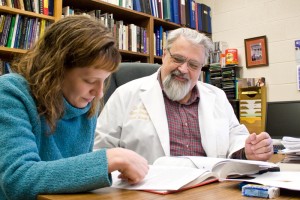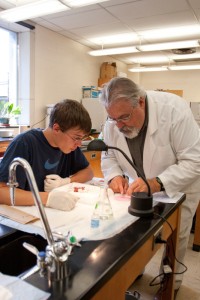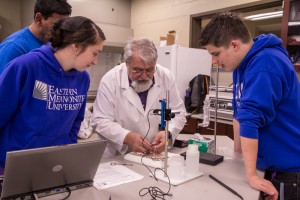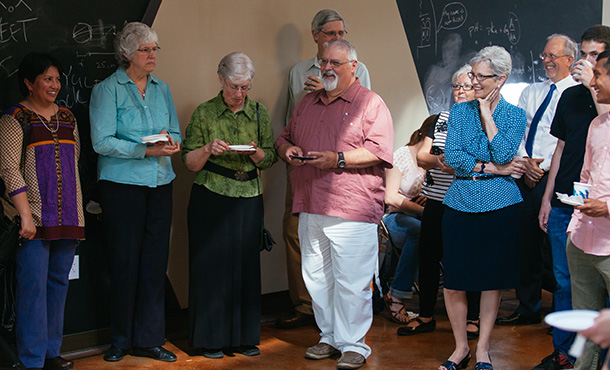All those years ago, the trajectory of Roman Miller’s young career had seemed so clear. He’d finished undergraduate and master’s degrees in biology and earned a PhD from Kent State University, specializing in male rats’ reproductive biology before landing a research position at the West Virginia University School of Medicine’s Department of Pharmacology. There, in the early ’80s, Miller was working in the lab of a well-connected professor and figured that before long, he’d be settling down in a tenure-track position at a medical school with a long research career ahead.
When he heard that EMU was hiring a biology professor, Miller’s initial reaction was unenthusiastic.
“I was a little bit afraid about what would happen with my research if I came to a teaching institution,” recalls Miller, who will retire at the end of May after 31 years in the job he’d once regarded with ambivalence. “That’s not what I was preparing myself for back then.”
 Nonetheless, he sent off his resume and forgot all about it. Of course, before long, he’d been offered the Daniel B. Suter Endowed Chair in the biology department (a position that, critically, allowed time to continue his own research) and was assured that it was not only permissible but desirable that his Christian faith accompany him into the classroom. All together, it was enough to coax him out of the fast lane and, in 1985, join the biology faculty at a tiny Mennonite college in Virginia.
Nonetheless, he sent off his resume and forgot all about it. Of course, before long, he’d been offered the Daniel B. Suter Endowed Chair in the biology department (a position that, critically, allowed time to continue his own research) and was assured that it was not only permissible but desirable that his Christian faith accompany him into the classroom. All together, it was enough to coax him out of the fast lane and, in 1985, join the biology faculty at a tiny Mennonite college in Virginia.
Fostering student research
Though his primary responsibility at EMU was teaching, Miller continued to pursue research projects with students. When he arrived, he was the only biology professor consistently working with students on serious research that was published. Now, that’s a priority of every member of the EMU science faculty – a change that Miller is proud to have played a part in over the years.
Another priority when he arrived on campus was maintaining the program’s emphasis on preparing students for medical school. During Miller’s years at EMU, he set – and often met – the lofty goal of doubling the national average medical school acceptance rate. He also expanded students’ opportunities by creating the Pre-Professional Health Sciences program for students intending to pursue various careers in healthcare.
I n 1989, EMU hosted a conference entitled “Bioethics and the Beginning of Life.” Miller was the primary organizer and co-edited a book by the same title with Beryl Brubaker, then a professor of nursing. He and Brubaker (who had since become university provost) later co-edited another book, Viewing New Creations with Anabaptist Eyes, which emerged from a larger, national conference on bioethics held at EMU in 2003.
n 1989, EMU hosted a conference entitled “Bioethics and the Beginning of Life.” Miller was the primary organizer and co-edited a book by the same title with Beryl Brubaker, then a professor of nursing. He and Brubaker (who had since become university provost) later co-edited another book, Viewing New Creations with Anabaptist Eyes, which emerged from a larger, national conference on bioethics held at EMU in 2003.
“Those two conferences were very significant, and he was the person behind both of them,” recalls Brubaker, who describes Miller as a “high-energy person who likes to get things done.”
His scholarly works and contributions continued on this topic from 1999-2007, when Miller edited the journal Perspectives on Science and Christian Faith.
In 2011, with chemistry professor Tara Kishbaugh and Bible and religion professor Christian Early, Miller helped organize his third and biggest conference at EMU “Conversations on Attachment.”
An influential scientist and educator
As part of his endowed role in the Suter Chair, Miller wrote numerous grant proposals and was awarded multiple small grants from National Science Foundation, Templeton Foundation, and United States Department of Agriculture, totaling $350,000 in extramural funds to support various program and research initiatives.
Speaking at his recent retirement party, Tara Kishbaugh, a chemistry professor and chair of the biology and chemistry departments, highlighted Miller’s “deep understanding of Anabaptist history” and influential role in exploring “the various ways that faith and science can intersect” as additional pieces of his legacy.
Among undergraduates he’s helped to prepare for medical school, Miller is a well-respected and well-remembered mentor.
“I remember his class on bioethics being one of the most influential during my time at EMU,” said Trent Hummel ‘97, a pediatric oncologist at Cincinnati Children’s Hospital. “He made me really think critically in a way I hadn’t ever done before.”
Toward the end of his career at EMU, Miller’s biggest project involved the creation of the MA in Biomedicine program. He’d begun floating the idea about a decade ago, though it took several years for the idea to gain wider support. The program – designed to prepare graduate students to enter medical or dental school, a teaching career or healthcare administration – admitted its first students in the fall of 2012. Though he’d once planned to retire after an even 30 years at EMU, Miller postponed that by a year to make sure the biomedicine program developed a firm foundation.
Blueberries and sheep
 Though science was his profession, Miller grew up in a farming family and never lost his affinity for agriculture. He and his wife, Elva, raise Barbados Blackbelly sheep, collie dogs and organic-certified blueberries west of Harrisonburg. Over the past several years, Miller has brought his research background to the cultivation of a blueberry patch, winning several grants from the U.S. Department of Agriculture to research organic horticultural techniques. (In lieu of a card, his colleagues on the science faculty presented him with copy of Blueberries for Sal at his recent retirement party).
Though science was his profession, Miller grew up in a farming family and never lost his affinity for agriculture. He and his wife, Elva, raise Barbados Blackbelly sheep, collie dogs and organic-certified blueberries west of Harrisonburg. Over the past several years, Miller has brought his research background to the cultivation of a blueberry patch, winning several grants from the U.S. Department of Agriculture to research organic horticultural techniques. (In lieu of a card, his colleagues on the science faculty presented him with copy of Blueberries for Sal at his recent retirement party).
Blueberry science also eventually found its way into his laboratory. The last major research project Miller is finishing up with undergraduate assistants is investigating how blueberry antioxidants can protect unborn mice from fetal alcohol syndrome.
At the end of May, Miller’s 31-year career at EMU will officially come to an end. Later in the summer, he’ll have a blueberry patch to harvest and plans to keep his schedule unencumbered through the end of the year while he clears the backlog from the farm to-do list. After that, he’ll have time and energy to invest in something, though what that will be exactly, isn’t yet clear.
“If you have good suggestions, I’m open to them,” he says.
Other retiring faculty and staff
Also retiring are the following faculty and staff (position listed is most recent held): Linda Alley, administrative assistant for events, director of the Summer Institute for Spiritual Formation and of the Congregational Resource Center, Eastern Mennonite Seminary, 27 years; Professor Don Clymer, Department of Language and Literature, 17 years; Professor Spencer Cowles, Department of Business, 27 years; Jan Gerber, information officer, 23 years; Professor David Glanzer, co-founder of the MA in Counseling program (39 years); Professor Ted Grimsrud, Department of Bible and Religion, 20 years; Betty Hertzler, postal supervisor, 41 years; Eldon Kurtz, director of the physical plant, 28 years; Jack Rutt, special projects support, 17 years; and Pamela Rutt, assistant director of the education graduate program at EMU Lancaster, 18 years.
